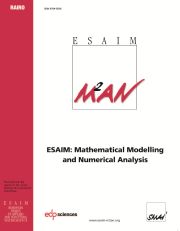Crossref Citations
This article has been cited by the following publications. This list is generated based on data provided by Crossref.
Colmenares, Eligio
Gatica, Gabriel N.
and
Oyarzúa, Ricardo
2015.
Fixed point strategies for mixed variational formulations of the stationary Boussinesq problem.
Comptes Rendus. Mathématique,
Vol. 354,
Issue. 1,
p.
57.
Colmenares, Eligio
Gatica, Gabriel N.
and
Oyarzúa, Ricardo
2016.
Analysis of an augmented mixed‐primal formulation for the stationary Boussinesq problem.
Numerical Methods for Partial Differential Equations,
Vol. 32,
Issue. 2,
p.
445.
Howell, Jason S.
Neilan, Michael
and
Walkington, Noel J.
2016.
A Dual–Mixed Finite Element Method for the Brinkman Problem.
The SMAI Journal of computational mathematics,
Vol. 2,
Issue. ,
p.
1.
Qiu, Weifeng
and
Shi, Ke
2016.
A superconvergent HDG method for the incompressible Navier–Stokes equations on general polyhedral meshes.
IMA Journal of Numerical Analysis,
Vol. 36,
Issue. 4,
p.
1943.
Lee, Jeonghun J.
2016.
Towards a unified analysis of mixed methods for elasticity with weakly symmetric stress.
Advances in Computational Mathematics,
Vol. 42,
Issue. 2,
p.
361.
Colmenares, Eligio
and
Neilan, Michael
2016.
Dual-mixed finite element methods for the stationary Boussinesq problem.
Computers & Mathematics with Applications,
Vol. 72,
Issue. 7,
p.
1828.
Gatica, Gabriel N.
Gatica, Luis F.
and
Sequeira, Filánder A.
2016.
A priori and a posteriori error analyses of a pseudostress-based mixed formulation for linear elasticity.
Computers & Mathematics with Applications,
Vol. 71,
Issue. 2,
p.
585.
Caman͂o, Jessika
Gatica, Gabriel N.
Oyarzúa, Ricardo
and
Tierra, Giordano
2016.
An Augmented Mixed Finite Element Method for the Navier--Stokes Equations with Variable Viscosity.
SIAM Journal on Numerical Analysis,
Vol. 54,
Issue. 2,
p.
1069.
Gatica, Gabriel N.
Ruiz-Baier, Ricardo
and
Tierra, Giordano
2016.
A posteriori error analysis of an augmented mixed method for the Navier–Stokes equations with nonlinear viscosity.
Computers & Mathematics with Applications,
Vol. 72,
Issue. 9,
p.
2289.
Chung, Eric T.
and
Qiu, Weifeng
2017.
Analysis of an SDG Method for the Incompressible Navier--Stokes Equations.
SIAM Journal on Numerical Analysis,
Vol. 55,
Issue. 2,
p.
543.
Caucao, Sergio
Gatica, Gabriel N.
Oyarzúa, Ricardo
and
Šebestová, Ivana
2017.
A fully-mixed finite element method for the Navier–Stokes/Darcy coupled problem with nonlinear viscosity.
Journal of Numerical Mathematics,
Vol. 25,
Issue. 2,
Camaño, Jessika
Gatica, Gabriel N.
Oyarzúa, Ricardo
and
Ruiz‐Baier, Ricardo
2017.
An augmented stress‐based mixed finite element method for the steady state Navier‐Stokes equations with nonlinear viscosity.
Numerical Methods for Partial Differential Equations,
Vol. 33,
Issue. 5,
p.
1692.
Gatica, Luis F.
Oyarzúa, Ricardo
and
Sánchez, Nestor
2018.
A priori and a posteriori error analysis of an augmented mixed-FEM for the Navier–Stokes–Brinkman problem.
Computers & Mathematics with Applications,
Vol. 75,
Issue. 7,
p.
2420.
Gatica, Gabriel N.
Munar, Mauricio
and
Sequeira, Filánder A.
2018.
A mixed virtual element method for the Navier–Stokes equations.
Mathematical Models and Methods in Applied Sciences,
Vol. 28,
Issue. 14,
p.
2719.
Camaño, Jessika
Oyarzúa, Ricardo
Ruiz-Baier, Ricardo
and
Tierra, Giordano
2018.
Error analysis of an augmented mixed method for the Navier–Stokes problem with mixed boundary conditions.
IMA Journal of Numerical Analysis,
Vol. 38,
Issue. 3,
p.
1452.
Howell, Jason S.
2018.
Prestructuring sparse matrices with dense rows and columns via null space methods.
Numerical Linear Algebra with Applications,
Vol. 25,
Issue. 2,
Farrell, P. E.
Gazca-Orozco, P. A.
and
Süli, E.
2020.
Numerical Analysis of Unsteady Implicitly Constituted Incompressible Fluids: 3-Field Formulation.
SIAM Journal on Numerical Analysis,
Vol. 58,
Issue. 1,
p.
757.
Colmenares, Eligio
Gatica, Gabriel N.
and
Moraga, Sebastián
2020.
A Banach spaces-based analysis of a new fully-mixed finite element method for the Boussinesq problem.
ESAIM: Mathematical Modelling and Numerical Analysis,
Vol. 54,
Issue. 5,
p.
1525.
Benavides, Gonzalo A.
Caucao, Sergio
Gatica, Gabriel N.
and
Hopper, Alejandro A.
2020.
A Banach spaces-based analysis of a new mixed-primal finite element method for a coupled flow-transport problem.
Computer Methods in Applied Mechanics and Engineering,
Vol. 371,
Issue. ,
p.
113285.
Camaño, Jessika
García, Carlos
and
Oyarzúa, Ricardo
2021.
Analysis of a momentum conservative mixed‐FEM for the stationary Navier–Stokes problem.
Numerical Methods for Partial Differential Equations,
Vol. 37,
Issue. 5,
p.
2895.

